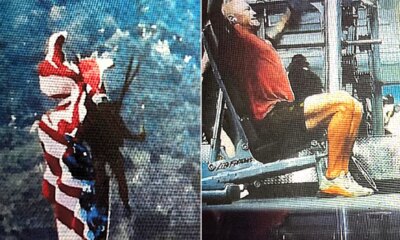West
Terrifying video shows gorilla smash glass as crowd reacts in disbelief

NEWYou can now listen to Fox News articles!
Visitors at the San Diego Zoo in California were left in shock over the weekend after an animal went bananas.
A male gorilla charged his habitat, shattering one layer of the three-layer glass window.
Dramatic video shows the moment the western lowland gorilla stormed the tempered glass on Saturday.
MEDIEVAL SHOE FOUND IN VULTURE NEXT REVEALS CENTURIES-OLD SECRETS IN EUROPEAN MOUNTAIN CAVES
Reactions from the crowd can be heard in the background — with zoo visitors gasping.
Zoo officials confirmed the incident to the New York Post, noting it was their 10-year-old gorilla named Denny who was responsible.
A gorilla is shown within its enclosure at the San Diego Zoo at the time of the incident on Saturday, Oct. 11. (Emily Holguin)
The 10-year-old gorilla was in the enclosure with another animal and was not injured.
“It is common for male gorillas, especially in adolescence, to express these types of behaviors,” the San Diego spokesperson told the NYP.
CLICK HERE FOR MORE LIFESTYLE STORIES
The spokesperson added that “bursts of energy, charging, dragging items or running sideways are all natural [behaviors] for a young male.”
Shattered glass is shown in a gorilla enclosure at the San Diego Zoo. (Emily Holguin)
Western lowland gorillas can reach 4 to 6 feet tall, weighing between 155 and 420 pounds, according to the Los Angeles Zoo and Botanical Gardens (LAZB).
“Gorillas at the San Diego Zoo Safari Park peel radishes with their teeth before eating them,” writes the website.
TEST YOURSELF WITH OUR LATEST LIFESTYLE QUIZ
Males tend to be twice the size of females, with most members of the species living between 35 and 50 years old, according to LAZB.
A gorilla is seen at the San Diego Zoo, with the shattered glass shown at right after a young male (not pictured) charged the window. (Emily Holguin)
The International Fund for Animal Welfare notes that the western lowlands are the smallest of the gorilla species.
Fox News Digital reached out to the San Diego Zoo for comment.
Read the full article from Here

West
LAPD officer hit with felony charges after allegedly skydiving while collecting full disability benefits

NEWYou can now listen to Fox News articles!
Officials on Wednesday accused a Los Angeles police officer of insurance fraud after he allegedly went skydiving multiple times while collecting full disability benefits.
Christopher Brandon Carnahan, 43, of Norwalk, was charged Monday after allegedly exaggerating an on-duty injury sustained in 2023, according to the Los Angeles County District Attorney’s Office.
Carnahan is a veteran officer who has been with the Los Angeles Police Department (LAPD) 18 years, according to WatchTheWatchers.net, citing California public records.
“This case is about honesty and accountability,” Los Angeles County District Attorney Nathan J. Hochman said in a statement.
Christopher Brandon Carnahan appears to skydive at Skydive Elsinore in Lake Elsinore. (District Attorney’s Office for the Los Angeles County District)
“Claiming to be temporarily totally disabled and collecting disability benefits intended for injured workers while engaging in physically demanding activities like skydiving is a crime. This is an officer who knows the law and understands the standards he is sworn to uphold.”
On May 22, 2023, Carnahan claimed he injured his left elbow while on duty and was subsequently placed on temporary totally disabled (TTD) status, officials said.
Police under TTD are entitled to receive 100% of their base salary tax-free for up to a year and then two-thirds afterward if the injury persists.
EX-ERIC ADAMS STAFFER WHO CELEBRATED CHARLIE KIRK ASSASSINATION POCKETED $36K IN BRIBERY, FRAUD CASES: FEDS
Surveillance footage captures Carnahan working out at a fitness center with dumbbells. (District Attorney’s Office for the Los Angeles County District)
Contrary to claims of being completely disabled, Carnahan allegedly engaged in strenuous physical activity, including working out and completing “many skydives” at Skydive Elsinore in Lake Elsinore, south of Los Angeles.
The District Attorney’s Office also released photos showing what appears to be Carnahan skydiving and exercising at a fitness center. In one image, dated May 23, 2024, the LAPD officer is seen holding dumbbells in a motion that involves his elbows.
CLICK HERE TO DOWNLOAD THE FOX NEWS APP
A Los Angeles Police Department vehicle is parked in the city. (Los Angeles Police Department)
He faces two counts of felony insurance fraud and is being held on $100,000 bail. If convicted, Carnahan could be sentenced to six years in jail.
The LAPD, which is investigating the case, is expected to review Carnahan’s employment status pending the outcome of his criminal trial.
Read the full article from Here
San Francisco, CA
Hundreds Rally in San Francisco Against U.S.-Israel Strikes on Iran | KQED

She acknowledged that Iranian Americans hold a range of political views, including some who support U.S. intervention, but said she believes the future of Iran should be determined by its people.
“The Iranian people in Iran can decide the future of their country,” she said. “War, I don’t think, is going to help.”
Speaking to the crowd, Mortazavi challenged what she described as a narrative that Iranians broadly support U.S. and Israeli military action.
“They want you to believe that every Iranian … is cheering on the United States and Israel,” she said. “That is unequivocally false.”
She urged attendees to continue organizing beyond the rally and announced plans for additional demonstrations.
Dina Saadeh, an organizer with the Palestinian Youth Movement, said multiple groups mobilized quickly in response to the strikes.
“I’m angered today,” Saadeh told KQED. “People here don’t want to see our country engaged in more endless war.”
Saadeh described the protest as part of a broader effort to oppose sanctions, military escalation and what she called U.S. imperialism. She said participants were calling on elected officials to redirect public funds toward domestic needs.
“People want money for jobs and education, not for war and occupation,” she said.
KQED’s María Fernanda Bernal contributed to this story.
Denver, CO
Police searching for information after fatal assault in Denver

Denver police are looking for information that could help them identify the suspect in a fatal assault overnight.
Officers were called to the scene in the 9700 block of E. Hampden Avenue around 2:08 a.m. They said an injured man at the scene was taken to a hospital for treatment, but he has been pronounced deceased.
DPD says they’re investigating the case as a homicide. They did not provide the identity of the man who was killed or further details on the case.
Police encouraged anyone with information about the attack or the possible suspect(s) involved to contact Metro Denver Crime Stoppers.
-

 World4 days ago
World4 days agoExclusive: DeepSeek withholds latest AI model from US chipmakers including Nvidia, sources say
-

 Massachusetts4 days ago
Massachusetts4 days agoMother and daughter injured in Taunton house explosion
-

 Montana1 week ago
Montana1 week ago2026 MHSA Montana Wrestling State Championship Brackets And Results – FloWrestling
-

 Denver, CO4 days ago
Denver, CO4 days ago10 acres charred, 5 injured in Thornton grass fire, evacuation orders lifted
-

 Louisiana7 days ago
Louisiana7 days agoWildfire near Gum Swamp Road in Livingston Parish now under control; more than 200 acres burned
-

 Technology1 week ago
Technology1 week agoYouTube TV billing scam emails are hitting inboxes
-

 Technology1 week ago
Technology1 week agoStellantis is in a crisis of its own making
-

 Politics1 week ago
Politics1 week agoOpenAI didn’t contact police despite employees flagging mass shooter’s concerning chatbot interactions: REPORT
























